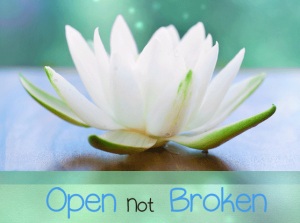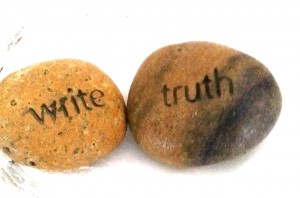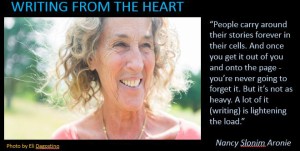People in the same room understand and empathize with each other in a way that isn’t possible on the page or screen.”
“It’s as if attentive people create a magnetic force field for stories that tellers themselves didn’t know they had within them.”
Gloria Steinem, My Life on the Road
This could be the answer to why an introverted writer opens a healing/writing center. Honest writing, attentive listening and sacred sharing.
Expressive writing for health is how I combine my passion for creativity with my hopes for social change.
I’ve been a reporter and covered stories, been given assignments and written to deadline. There’s a byline high to being in print and it’s nice to feel the power of the press, to be able to say, “I’m with so and so publication” and to get someone to take or return calls.
Quickly.
But it’s never been quite enough. For me, writing for a living and even earning an income as a writer isn’t a calling. I need something beyond reporting a story.
As a young girl I admired Robin Hood, Mighty Mouse, Wonder Woman and Underdog. I’ve harbored fantasies about making the world more just. What form does that take in real life? Being a lawyer? A social worker? An activist? I wasn’t quite sure. Not as a girl or an adult woman.
There’s a lot of hurt in a lot of people and in a lot of the world. For much of my life, I was hurting too.
How do have the sensitivity, perceptiveness and observant nature of a writer and not notice the pain of others too?
It’s impossible when seeking for ways to feel more peace and less anxiety to not want to share tips, tools and techniques.
Any of us who have been silenced or marginalized or felt our pain wasn’t the sort that could be talked about have often felt isolated. I’ve never heard of anyone struggling with traumatic stress say, “I had too much help. There were just so many fabulous ways to not be in pain and it was hard to choose. I just didn’t have time to handle all the support and help.”
No.
People are often desperate or embarrassed or isolated or trying so damn hard to feel better. In secret or private. It can be difficult work just to be human for any of us. For all of us. This is true when people grieve, are sick, are care taking or going through major life transitions.
It’s important to share our secrets and struggles and then what helps.
We need to help each other out.
There’s satisfaction from being a helper.
I’ve worked in a shelter for homeless families. I’ve taught free-writing in a shelter for women getting out of abusive relationships. I’ve done lots and lots of volunteer work too. It’s been wonderful and interesting.
But sometimes I was helping others because it was easier than being with or inside of my own skin.
When I’ve done only social change work and activism and had no time to write or rest, I’ve been unhappy. I’ve felt weighed down by all that is wrong in the world.
In my world or the world of others. Or both.
Writing brings hope, levity and meaning. Writing matters. Social change matters too. They work best when combined. At least for me. 
To me, writing is a form of hope. Even if all we can say is, “Things seem hopeless.” There’s something in that truth telling that causes change.
The feminists say, “The personal is political.”
Jung says, “One does not become enlightened by imagining figures of light, but by making the darkness conscious.”
Yup to both I say.
Plus, telling the truth is contagious.
When we share our own truth it gives other people permission to do the same. It is a balm to the soul to be able to be real with others.
We don’t have to have answers to feel fortified by sharing our sincere questions.
Writing for me is a need. It’s close to water, food, love and coffee.I need to write to stay centered and to slow down, savor and process the world through words.
Expressive writing for health is about creativity and change. In myself. In the world.
I’m particularly fond of expressive writing because it breaks silence, allows people to get some relief from the burdens of toxic and traumatic stress and can be done without a therapist.
It’s something people can do from a very young age or alone or in groups.
It’s something that can connect people deeply to their own soul and self and also to others.
The power of writing is in the process of writing. Not the sharing. Not in the outcome. Not in the publishing.
The process of writing like the process of exercise – it’s pretty darn good for most people even if it feels like it might be challenging or boring or hard.
After doing it, most of us know in our bones, “I’m better for that.”
It doesn’t have to be a graceful work out to get the heart pumping. What we express doesn’t have to be profoundly impressive if read out loud. It just has to be honest and emotional and from the gut and it needs to be come at from a new perspective. That’s it.
And while the writing doesn’t have to accomplish anything the process of writing can and does do much.
Studies show that expressive writing done consecutively, for twenty minutes a day improves sleep, wound healing and boosts immune system functioning. It reduces sick days. The “benefits” last six weeks to six months. It’s particularly beneficial when people write about trauma and things they’ve kept secret.
Imagine if a drug did all that? 
Sometimes there are other bonuses. Poetry, story and essay are crafted or drafted. But it’s not necessary.
Flashes of insight come and change us forever. People realize something on the spot and the way it lights up rooms and hearts. It’s stunning to see.
But it’s also a bonus.
Putting pen to paper is powerful. Just that. Just the writing.
Most writers say, “If my writing helps even one person writers often say it’s worth it.”
When we write expressively our writing always helps someone.
Us.
We help ourselves every single time. But too many non writers don’t know and that’s what I hope to change because I’m a writer and an activist. Because writing improves health.

The open page will hold all our stress and leave room in our bodies for hope and health.
Writing helps me parent better, be more present and keeps me from numbing myself. It keeps me connected to me. I’m relieved of what I’ve been carrying and walk lighter in my skin and world.
For those in pain or life transition or grieving, it is tempting to run away from our inner experiences. But when we do, the costs to our health can be high.
Writing allows us to release what we’ve been holding, sometimes for years, sometimes for decades. We need to share it to be lifted.
Expressive writing has power.
And it’s a power which pulls me out of my introversion and compels me to share with others. It’s a tool I want others to know how to use.
I feel uncomfortable speaking in front of groups but I know many feel uncomfortable writing. I try to remind myself that it doesn’t have to be comfortable to be beneficial. For me and those who write.
This is something the world needs.
I let my passion help me to be brave because expressive writing is portable and affordable and effective.
I have decades of experience. It’s a process I never tire of. It’s personal, it’s political and it’s powerful.
I love what I get to experience, share and teach. But people can learn it on their own as well by reading the work of Nancy Slonim Aronie, Natalie Goldberg, Louse DeSalvo or James Pennebaker. 
The process is not complicated or hard.
An open page is a scared start and it’s available to most everyone. It allows us to be both the author and the audience and to revise and shift the story of our lives.
Healing is possible “write’ now. In this moment and that’s true day after day after day.
You Matter Mantras
- Trauma sucks. You don't.
- Write to express not to impress.
- It's not trauma informed if it's not informed by trauma survivors.
- Breathing isn't optional.
You Are Invited Too & To:
- Heal Write Now on Facebook
- Parenting with ACEs at the ACEsConectionNetwork
- The #FacesOfPTSD campaign.
- When I'm not post-traumatically pissed or stressed I try to Twitter, Instagram & Pinterest.
Speak Your Mind